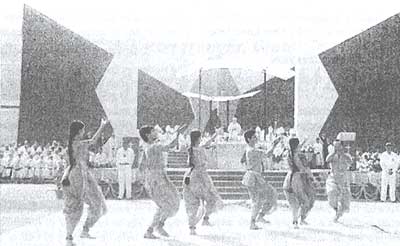

![]()
![]()
|
Newsletter of the District of Asia January - February 2000 THE TEACHINGS OF THE FEDERATION OF ASIAN EPISCOPAL CONFERENCES Translated
from Eglises d'Asie, September 1999, pp. 26-31
1. NEW ECCLESIOLOGY " ... To be a local church ... a local church lives in a continuous historical process of inculturation because the Church is a community of faith in expansion.and that culture itself continues to change and to evolve..." Commentary by Fr. Couture: This new church is not the Roman Catholic Church. It rapidly breaks all the ties with Romanity which is a mark of the true Church. It breaks with a) the Roman authority viewed as "Western", replacing it with the national Bishops' Conference (this is a sophism, identifying Rome as 'Western' because it is located in Italy! We are not Italian Catholics. Rome is indeed in Italy but, as the Head of the Church, it is not Italian - St Peter and many Popes after him were not Europeans! ) b) Roman language, Latin, replacing it with vernacular in the official worship; c) Roman rites of the Sacrament, the Sacrifice of the Mass in particular, which goes back, in its essential parts, to St Peter himself. In other words, inculturation is another word for de-romanization. There will soon be nothing Roman left in the Catholic churches of Asia except an empty name. Then the various churches will be ready to form truly schismatic national churches, totally independent from Rome, from the Church founded by Our Lord Jesus Christ. 2. EVANGELIZATION " ...the central point ... is the construction of a local church." Commentary: From another report of a missionary meeting in Nagpur, India (of 31 bishops, 88 priests, and many others), we read the following: "Evangelization is usually understood as a method to draw new members. The participants of this convention prefer another definition of evangelization which identifies itself with the promotion of the well-being of humanity and with a struggle against anything that opposes it . ... The final report has therefore called the missionaries to get involved in the integral development of man and to do it with courage..." (Eglise D'Asie, Nov. 16, 1999, p.8) St. Matthew 28, 19-20: "Going therefore, teach all nations; baptizing them in the name of the Father, and of the Son, and of the Holy Ghost. Teaching them to observe all things whatsoever I have commanded you..." (Such as the necessity of baptism, in John 3, 5: "Amen, amen I say to thee: unless a man be born again of the water and of the Holy Ghost, he cannot enter into the kingdom of God", and the necessity of Holy Communion, in John 6, 54: "Except you eat the flesh of the Son of man and drink His blood, you shall not have life in youl"). St. Mark 16, 15-16: "And He said to them: Go ye into the whole world and preach the Gospel to every creature. He that believeth and is baptized, shall be saved, but he that does not believe shall be condemned." If these bishops and priests really mean what they say, then they are in big trouble as they are explicitly preaching a new Gospel, and therefore falling under St .Paul's curse: "Though we, or an angel of Heaven preach a Gospel to you other than that which we have preached to you, let him be anathema." (Galatians 1,8). 3. INTERRELIGIOUS DIALOGUE The two principal foundations: 1 - "The certainty of the universality of grace .... The paths of divine grace are mysterious and we do not know well the paths of God caught with men placed in a great diversity of situation, including the religious ones..." 2 - "We should also know that for human beings, there are thousands of ways to respond to the grace found in the concrete existential situations which are theirs, including the religions to which they belong. In one way, religions can be considered as responses to the meeting with the mystery of God or the ultimate reality . ... Thus " religious traditions have a place in the economy of salvation . ... If is an unavoidable truth that the Spirit of God is at work in all the traditional religions..." Commentary:
To no. 2 : "religious traditions have a place in the economy of salvation... It is an unavoidable truth that the Spirit of God is at work in all the traditional religions..." except ... You guessed which Tradition, which Traditional Religion! These bishops are certainly a good example on how to be in contradiction with oneself. |
